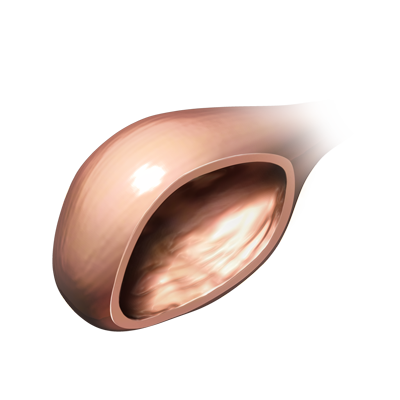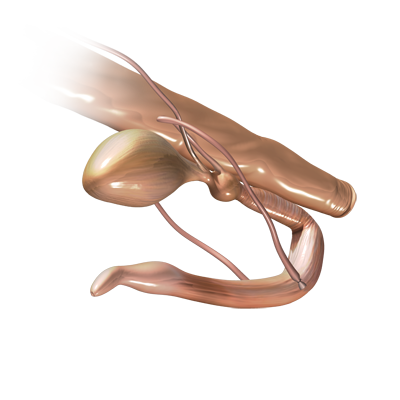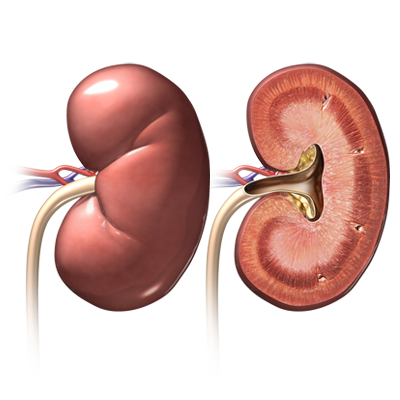
The urogenital system includes the urinary and reproductive organs.
The urinary system is divided into two regions based on anatomy and function: upper (kidneys and ureters) and lower urinary (urinary bladder and urethra) tracts. The upper urinary tract filters metabolic wastes from the blood to be excreted into the urine. The kidneys also participate in blood pressure regulation and maintenance of the delicate electrolyte and water balance within the body-keeping only what is needed. The lower urinary tract serves as a reservoir for urine (bladder) and a pathway for excretion (urethra). Indications of a urinary tract problem are varied: excessive urination and drinking, straining to urinate, blood in the urine, odor to urine, vomiting, diarrhea, inappetance, incontinence, and lethargy.
The genital system consists of the reproductive organs: the testicles and prostate. These organs produce hormones and allow reproduction. Signs associated with genital tract problems include: discharge, odor, straining to urinate and/or defecate, and lethargy.
Common urogenital ailments affecting dogs:
- Urinary tract infections (UTI): common in female dogs. Urinary tract infections in male dogs are uncommon due to the length of their urethra. UTI in a male dog may signal the presence of an underlying problem, such as bladder stones, poor immune function, or prostatic disease.
- Kidney failure: acute and chronic. Acute kidney failure can be caused by infections, kidney stones, toxins, and drugs to name a few. Aging pets may develop chronic kidney failure. Often, by the time chronic kidney failure is diagnosed, the cause cannot be determined.
- Urinary bladder stones : some stones form due to the presence of infection; others form by mineral imbalances in the urine. Kidney stones are less common.
- Prostatic disease : common in intact male dogs; uncommon in neutered males. Ailments include: infection, cysts, benign enlargement due to influence of testosterone, cancers. Neutering does not decrease the incidence of cancers.
Bladder

Urine, produced by the kidneys, is stored in the urinary bladder before exiting the body through the urethra. The urethra acts as a channel for urine excretion; its length offers protection against infection. Dogs with repeated or persistent urinary tract infections or inflammation need to be evaluated for an underlying cause, such as stones in the urinary bladder, prostatic disease (males), and cancer. Dogs with bladder inflammation strain to urinate; they may have obvious blood in their urine. An inability to urinate (posture to urinate and nothing comes out) requires emergency treatment to relieve the painful obstruction.
Castration

The male dog’s reproductive tract includes two testicles, housed within the scrotum, and the prostate gland, which lies just behind the urinary bladder. Dogs that will not be used for breeding should be castrated (surgical removal of the hormone producing testicles) around 6 months of age to prevent pet overpopulation and avoid unwanted behaviors (e.g.: inter-dog aggression, roaming to find a mate). Castration greatly decreases the chances of your dog developing prostatic enlargement and infections; it eliminates testicular disease. During the neutering procedure, a small incision is made near the scrotum to allow removal of both testicles. Your recovering dog needs to be rested-no running or jumping. Overactivity can lead to complications such as bleeding and infection. Rest assured that neutering your dog will not change their loving personality; it will make them less prone to illness.
Kidneys

The kidneys, lying just under the spinal column, receive nearly 25% of the blood pumped out of the heart. The kidneys maintain water and electrolyte balance, regulate blood pressure and provide an elimination route for toxins. Illness due to kidney disease may be due to infection, inflammation, toxin ingestion (e.g.: lilies and antifreeze), and cancer. Symptoms of kidney disease vary widely depending on the underlying cause. Dogs with acute (sudden) kidney failure are quite ill: vomiting, lethargy, and anorexia. In contrast, dogs with chronic (slow onset) kidney failure may not show any outward signs of a problem; the kidney disease is often incidentally found on screening lab work. Regular wellness testing with blood and urine evaluations allows early detection and treatment of kidney disease.
Neuter

The male dog’s reproductive tract includes two testicles, housed within the scrotum, and the prostate gland, which lies just behind the urinary bladder. Dogs that will not be used for breeding should be castrated (surgical removal of the hormone producing testicles) around 6 months of age to prevent pet overpopulation and avoid unwanted behaviors (e.g.: inter-dog aggression, roaming to find a mate). Castration greatly decreases the chances of your dog developing prostatic enlargement and infections; it eliminates testicular disease. During the neutering procedure, a small incision is made near the scrotum to allow removal of both testicles. Your recovering dog needs to be rested-no running or jumping. Overactivity can lead to complications such as bleeding and infection. Rest assured that neutering your dog will not change their loving personality; it will make them less prone to illness.
Prostate Cancer

The prostate gland resides in the pelvic canal and produces the fluid that nourishes sperm. Prostatic cancer, although rare, occurs more commonly in older intact male dogs. Prostatic cancer does not appear to be influenced by testosterone. In fact, neutered dogs with prostatic enlargement have a higher likelihood of having a malignant (cancerous) disease. Cancer of the prostate gland tends to be aggressive in nature; it spreads to the local lymph nodes and the spine near the prostate gland. Dogs with prostatic disease, benign or malignant, have similar clinical signs: straining to urinate and/or defecate, blood in the urine, constipation, and/or spinal pain. Definitive diagnosis of prostate cancer requires physical and rectal examinations, an abdominal ultrasound, and a biopsy of the prostate. Treatment for prostatic cancer uses a combination of anti-inflammatory drugs, chemotherapy, and radiation therapy. Surgical removal of prostate tumors is not commonly done due to the high incidence of complications (e.g.: urinary incontinence).
Testes

The dog has two testicles, housed within the scrotum. Testicular diseases in dogs include congenital abnormalities, such as cryptorchidism (testicle fails to descend into scrotum and is retained in the abdomen); infections; trauma; torsion; and tumors. Dogs with testicular disease may present with a swelling in the scrotum or problems during breeding. Dogs that will not be used for breeding should be castrated (surgical removal of the hormone producing testicles) to prevent pet overpopulation, avoid unwanted behaviors (e.g.: inter-dog aggression and roaming to find a mate), and potentially cure the disease.
Urinary Tract Infection

Simple urinary tract infections (UTI) occur more frequently in female dogs due to the short length of their urethra. Male dogs, on the other hand, have a long urethra, which offers more protection from infection. While cats may suffer from urinary tract inflammation, the majority of the episodes are not associated with infections. Pets with a urinary tract infection may: strain to urinate, have accidents in the house, have blood in the urine, and have a foul odor to the urine. A urinalysis and urine culture confirms the UTI diagnosis. Most UTIs resolve with a 10-14 day course of an oral antibiotic. Despite proper treatment, some patients develop persistent or recurring UTIs. These patients require further investigation (e.g.: blood work, repeat urine cultures, and x-rays and/or ultrasound to visualize the bladder) to search for complicating factors such as: urinary bladder stones, prostatic disease, resistant infections, immunosuppressive disorders (e.g.: chronic kidney disease and Cushing’s disease), and urinary bladder anatomical defects.
Urogenital Normal

The male dog’s reproductive tract includes two testicles, housed within the scrotum, and the prostate gland, which lies just behind the urinary bladder. Dogs that will not be used for breeding should be castrated (surgical removal of the hormone producing testicles) to prevent pet overpopulation and unwanted behaviors (e.g.: inter-dog aggression, roaming to find a mate). Castration greatly decreases the chances of your dog developing prostatic enlargement and infections; it eliminates testicular disease. Neutering your dog will not change their loving personality; it will make them less prone to illness. A castrated dog will focus more on your family rather than finding a mate.
What's Next
Call us to schedule an appointment
Meet with a doctor for an initial exam.
Put a plan together for your pet.

